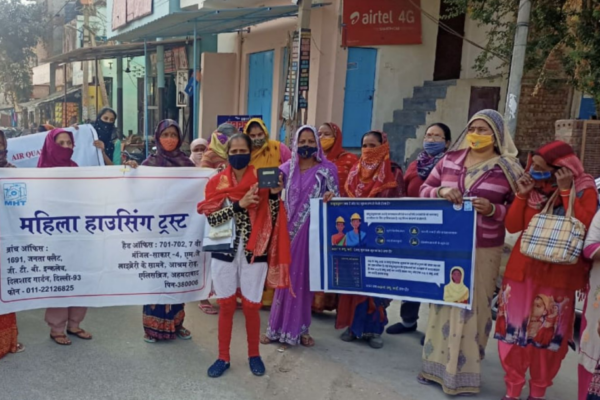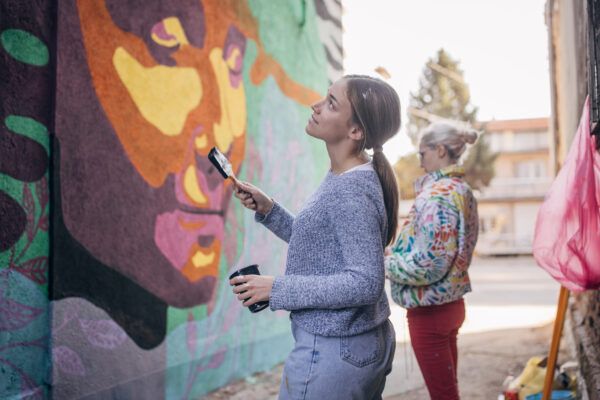Usha Rani works at a Delhi construction site with her husband, carrying bricks all day. She hails from Samastipur, Bihar, but has made her home in an informal settlement of construction workers with her husband and 3-year-old child. Her son has bouts of breathlessness while playing. Last winter, 8 out of 10 children in Delhi complained of respiratory problems due to air pollution. Usha is expecting her second child and worries about her children’s safety, given her own failing health.
Poor air quality = inequality
Women construction workers like Usha are especially vulnerable to health risks such as anaemia, lung disease, insomnia, mental health issues and Chronic Obstructive Pulmonary Disease (COPD). The risk to pregnant and lactating women increases due to poor nutritional intake and air pollution. For every 10 microgram/metre cube increase in ambient PM2.5 exposure, the average anaemia prevalence among women increases by 7.23%, according to a study by IIT-Delhi.
For most people living in resettlement colonies or working in construction sites, toxins, pollution and waste is part of their everyday life. Usha’s struggles echo those of many other communities: according to some estimates, close to 10 million people living in informal settlements in Delhi face the same struggles of job instability, food insecurity and housing. These vulnerabilities become multiplied with depleting air quality, unsafe drinking water, no access to healthcare, dangerous working conditions and the climate crisis – the worst impacted are those on the margins, even though they contribute the least to climate change.
In addition to these inequities, the brunt of air pollution from construction falls squarely on the construction worker. Emergency measures, such as construction bans and school shutdowns during peak polluting months, affect the vulnerable the most, resulting in wage loss, learning loss for children, and increased job insecurity and anxiety.
An intersectional approach
Mahila Housing Trust and Help Delhi Breathe conducted research that showed a feeling of helplessness among women construction workers who were aware of air pollution, but felt unable to do anything about it. In their work with women construction workers, Mahila Housing Trust and Help Delhi Breathe took an intersectional approach to building leadership, while surfacing the voices of women who are most impacted by air pollution on strategies to combat, mitigate and adapt.
First, the affected communities, especially women, were willing to take concrete action on issues that affect them. Mahila Housing Trust identified and trained women in the community as Air Quality Index (AQI) ambassadors, making tangible the real-time effects of air pollution. The women ambassadors understood the level of pollution through portable air quality monitors, and developed solutions that were contextual and relevant to their lived realities. This new role empowered the women, who were utilising their voice and agency to benefit their community.
Second, air pollution started gaining resonance as a hyperlocal issue. For many communities, it was closely linked with improper solid waste management, drainage and garbage burning. In informal settlements, garbage burning, limited access to proper ventilation, and lack of green spaces were identified as closely linked to issues of air pollution. Women started using government platforms to engage and report local issues. The Delhi Government’s Green Delhi app was a welcome step: many women reported solid waste management needs to alert authorities to pollution issues for faster resolution.
Third, social welfare schemes are critical; greater budgetary allocation and effective implementation can improve the quality of life for the residents living in poverty. During the construction ban in November 2022, when many people who earned a daily wage were suddenly left without their jobs, the government announced compensation of INR5000 per month.
According to some estimates, roughly 700,000 of Delhi’s 1.5 million construction workers are registered or registering for compensation. This leaves thousands of vulnerable families without their full income. However, proper registration and documentation allowed workers access to compensation. AQI ambassadors played a key role in helping the workers get access.
Unlocking systemic solutions for support to the most vulnerable will be more effective than stop-gap temporary solutions. Government measures that recognise that air pollution can be tackled equitably are encouraging, like the free public bus transport for women, doctors on wheels for construction workers, and mobile creches for children of informal workers.
We have no time to lose. For a just and equitable society, social protection and welfare schemes and policies need to be effectively implemented, and reach those previously unreached, to be truly impactful.
Stakeholders from across the board, including media, civil society and local authorities, need to make space at the table for the voice of the informal sector worker. For Delhi to breathe easy again, every citizen living in the metropolis must feel seen and heard on the issues that most impact them.
This blog is part of series looking at air quality and equity. Subscribe to our newsletter to get future blogs straight to your inbox.
Image credit: Mahila Housting Trust

